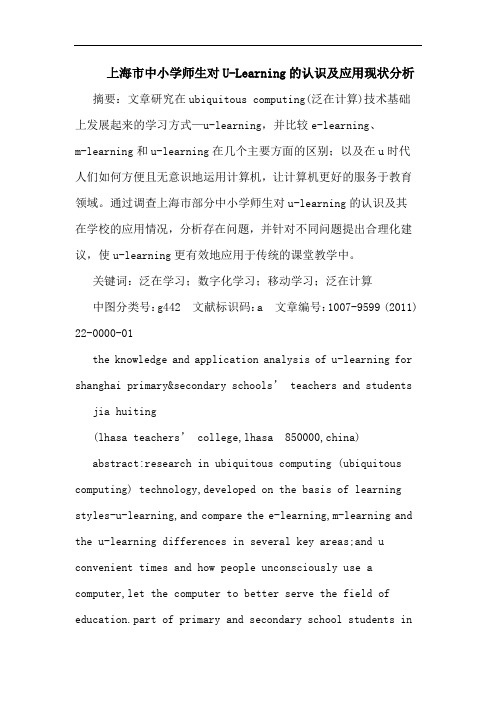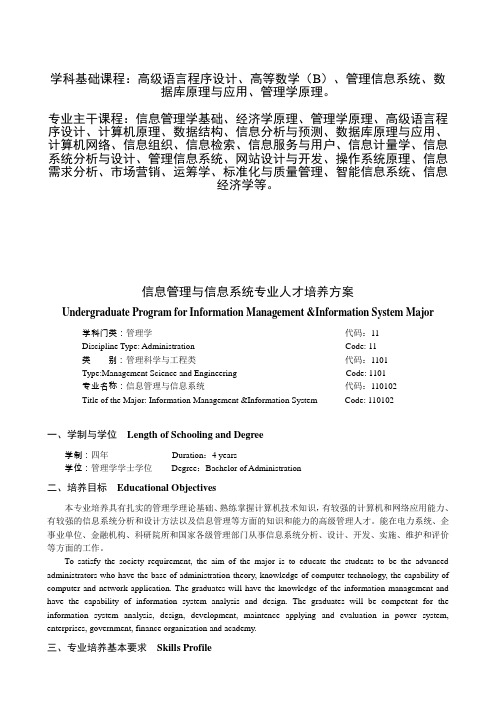4E-learning与信息管理
- 格式:ppt
- 大小:4.18 MB
- 文档页数:70

上海市中小学师生对U-Learning的认识及应用现状分析摘要:文章研究在ubiquitous computing(泛在计算)技术基础上发展起来的学习方式—u-learning,并比较e-learning、m-learning和u-learning在几个主要方面的区别;以及在u时代人们如何方便且无意识地运用计算机,让计算机更好的服务于教育领域。
通过调查上海市部分中小学师生对u-learning的认识及其在学校的应用情况,分析存在问题,并针对不同问题提出合理化建议,使u-learning更有效地应用于传统的课堂教学中。
关键词:泛在学习;数字化学习;移动学习;泛在计算中图分类号:g442 文献标识码:a 文章编号:1007-9599 (2011) 22-0000-01the knowledge and application analysis of u-learning for shanghai primary&secondary schools’ teachers and students jia huiting(lhasa teachers’ college,lhasa 850000,china)abstract:research in ubiquitous computing (ubiquitous computing) technology,developed on the basis of learning styles-u-learning,and compare the e-learning,m-learning and the u-learning differences in several key areas;and u convenient times and how people unconsciously use a computer,let the computer to better serve the field of education.part of primary and secondary school students inshanghai through the investigation of u-learning and understanding the application of the school,analyze problems,and to make reasonable suggestions for different problems,so u-learning more effectively applied to traditional classroom teaching.keywords:ubiquitous learning;digitalizationlearning;mobile learning;ubiquitous computing一、引言随着信息技术的不断发展,计算机技术在教育中的应用也成为现代教育的一个重要标志。

学科基础课程:高级语言程序设计、高等数学(B)、管理信息系统、数据库原理与应用、管理学原理。
专业主干课程:信息管理学基础、经济学原理、管理学原理、高级语言程序设计、计算机原理、数据结构、信息分析与预测、数据库原理与应用、计算机网络、信息组织、信息检索、信息服务与用户、信息计量学、信息系统分析与设计、管理信息系统、网站设计与开发、操作系统原理、信息需求分析、市场营销、运筹学、标准化与质量管理、智能信息系统、信息经济学等。
信息管理与信息系统专业人才培养方案Undergraduate Program for Information Management &Information System Major学科门类:管理学代码:11Discipline Type: Administration Code: 11类别:管理科学与工程类代码:1101Type:Management Science and Engineering Code: 1101专业名称:信息管理与信息系统代码:110102Title of the Major: Information Management &Information System Code: 110102一、学制与学位Length of Schooling and Degree学制:四年Duration:4 years学位:管理学学士学位Degree:Bachelor of Administration二、培养目标Educational Objectives本专业培养具有扎实的管理学理论基础、熟练掌握计算机技术知识,有较强的计算机和网络应用能力、有较强的信息系统分析和设计方法以及信息管理等方面的知识和能力的高级管理人才。
能在电力系统、企事业单位、金融机构、科研院所和国家各级管理部门从事信息系统分析、设计、开发、实施、维护和评价等方面的工作。
To satisfy the society requirement, the aim of the major is to educate the students to be the advanced administrators who have the base of administration theory, knowledge of computer technology, the capability of computer and network application. The graduates will have the knowledge of the information management and have the capability of information system analysis and design. The graduates will be competent for the information system analysis, design, development, maintence applying and evaluation in power system, enterprises, government, finance organization and academy.三、专业培养基本要求Skills Profile本专业学生主要学习和掌握信息管理和信息系统方面的基本理论、基本知识、方法和技能。


The Importance of Self-Reflection in Learning Self-reflection is an essential element in the learning process. It involves taking a step back from the learning experience and analyzing one's thoughts, feelings, and actions. Self-reflection allows learners to understand their strengths and weaknesses, identify areas for improvement, and set goals for future learning. In this essay, I will discuss the importance of self-reflection in learning from multiple perspectives.From a cognitive perspective, self-reflection enhances learning by engaging learners in metacognition. Metacognition is the process of thinking about one's own thinking. When learners engage in self-reflection, they are actively thinking about their learning process, which allows them to identify what they understand and what they don't understand. This awareness helps learners to identify their strengths and weaknesses, which in turn helps them to set appropriate learning goals. By setting goals, learners can focus their efforts on areas that require improvement, which leads to better learning outcomes.From an emotional perspective, self-reflection helps learners to develop a sense of self-awareness. Self-awareness is the ability to recognize and understand one's own emotions, thoughts, and behaviors. When learners engage in self-reflection, they are better able to recognize their emotional responses to different learning situations. This awareness helps learners to regulate their emotions, which in turn helps them to stay focused and engaged in the learning process. By being aware of their emotions, learners can also develop empathy for others, which is an important social skill.From a social perspective, self-reflection helps learners to develop their communication skills. Communication is a vital skill in today's world, and self-reflection can help learners to become better communicators. When learners engage in self-reflection, they are better able to understand their own communication style, which in turn helps them to communicate more effectively with others. By understanding their own communication style, learners can also become more aware of the communication styles of others, which is an important skill in building relationships.From a cultural perspective, self-reflection helps learners to become more culturally aware. Cultural awareness is the ability to recognize and understand different cultural perspectives. When learners engage in self-reflection, they are better able to understand their own cultural biases and assumptions, which in turn helps them to recognize and appreciate different cultural perspectives. By being culturally aware, learners can become more effective communicators and collaborators in multicultural settings.From a professional perspective, self-reflection helps learners to develop their professional skills. Professional skills are the skills that are required to succeed in the workplace. When learners engage in self-reflection, they are better able to identify their professional strengths and weaknesses, which in turn helps them to develop the skills that are required to succeed in their chosen profession. By developing their professional skills, learners can become more effective employees and leaders.In conclusion, self-reflection is an essential element in the learning process. It enhances learning by engaging learners in metacognition, helps learners to develop a sense of self-awareness, improves communication skills, promotes cultural awareness, and develops professional skills. As learners engage in self-reflection, they become more effective learners, communicators, collaborators, and leaders. Therefore, it is essential for learners to engage in self-reflection as part of their learning journey.。

港中文信息科学与技术管理课程介绍港中文信息科学与技术管理课程介绍港中文信息科学与技术管理课程,是一门具有前沿性和实践性的课程,旨在为学生提供信息科学及技术管理领域的相关知识和技能。
一、课程概述该课程主要涵盖信息科学和技术管理的理论和实践方面。
在信息科学方面,包括计算机科学、网络技术、数据库管理等基础知识,以及机器学习、人工智能、数据挖掘等前沿知识。
在技术管理方面,包括项目管理、运营管理、质量管理等实践技能,以及创新管理、领导力等领导者必备的素质。
二、课程特点1. 前沿性该课程每年都会根据信息科学和技术管理领域的最新发展,更新相应的课程内容。
因此,学生能够第一时间接触到最新的知识和技能,并且在跟随老师的指导下掌握这些知识和技能。
2. 实践性该课程注重实践教学,通过项目和案例分析等实践活动,让学生深入理解课程内容,并能够运用到实际项目中。
这有利于提高学生的实际能力和解决问题的能力。
3. 主动性该课程鼓励学生主动探究和思考,通过小组讨论和报告等方式,让学生主动地参与到课堂教学当中。
同时,老师也会对学生的课堂表现进行评价,以促进学生的自我提升。
三、课程安排该课程共分为两个学期,每周两次课。
其中,第一个学期主要涵盖信息科学方面的知识和技能;第二个学期则主要涵盖技术管理方面的知识和技能。
具体课程安排如下:第一学期1. 计算机科学基础2. 数据库管理基础3. 网络技术基础4. 机器学习和人工智能第二学期1. 项目管理2. 运营管理3. 创新管理4. 领导力四、结语通过港中文信息科学与技术管理课程的学习,学生能够掌握信息科学和技术管理领域的最新知识和技能,并且能够在实际项目中应用这些知识和技能。
这有助于提高学生的职业素质和竞争力,驰骋职场。

中外教育简史的名词解释在中外教育的发展过程中,涌现了许多备受赞誉的名词,这些名词承载着教育的变革和发展,并在一定程度上塑造了教育的现状和未来趋势。
本文将解释一些重要的名词,帮助读者更加深入地了解中外教育的简史。
1. 德国学派(Dewey)德国学派,以杜威(John Dewey)为代表,是发源于美国的一种教育思想流派。
杜威主张以学生个体能力的培养为核心,鼓励学生参与实践活动,通过“体验-反思-实践”的循环过程来促进学习。
德国学派的思想对现代教育产生了深远的影响,成为了许多国家教育改革的重要理论基础。
2. 小班化教学(Small Class Teaching)小班化教学是一种教育改革的模式,通过减少学生数量,提升教学质量和体验,促进学生的学习效果。
小班化教学可以更好地实现个性化教育,让教师更好地关注每个学生的发展,提供更为精细化的指导和评估。
在部分国家和地区,小班化教学已成为高质量教育的重要特征。
3. 项目制学习(Project-based Learning)项目制学习是一种以项目为核心的学习方式,通过自主合作的方式,让学生在解决现实问题的过程中进行学习。
项目制学习注重学生的主动参与和自主学习能力的培养,培养学生的批判思维和解决问题的能力。
该学习方式强调跨学科和实际应用,有利于培养学生的综合素养和创新精神。
4. 混合式学习(Blended Learning)混合式学习是指将传统的面对面教学与在线学习相结合的教学模式。
通过利用信息技术,学生可以在任何时间、任何地点进行学习,并通过线上平台获取教材、资源和作业。
混合式学习有利于提高学生的学习积极性和参与度,同时也能够提供更加个性化的学习支持和评估手段。
5. 社交学习(Social Learning)社交学习是指在社交环境中进行的学习过程,其中学生通过与他人互动和合作来促进知识和经验的交流。
社交学习注重学生之间的合作、互助和团队精神的培养,通过群体讨论、合作项目和互动游戏等方式来提高学习效果。
4e互动教学法
“4e互动教学法”是目前英语教学中较先进的应用方法,由安格互动英语开发,其特点在于运用科学的手段、先进的设备以及强大的教学系统上课,让枯燥乏味的英语课堂变得生动起来!课上运用先进的电子白板互动教学,以互动模式学习语言,通过实体线下授课、课后线上复习的方式,锻炼孩子的听说训练、写作训练和阅读训练,积极的提高孩子学习的兴趣,让孩子更轻松的听说读写英语。
这种课前课后运用网际学院进行交互式学习的教学方法,独特的多媒体手段结合先进的网际学院、点读笔,让孩子在快乐、互动中更享受英语的学习。
透过e化教学,让英语学习“动”起来
e-teaching:教师教学数位化(平面内容专制成网际学校的多媒体课程;活用电子白板做教学)
e-learning:学生学习数位化(利用动画学习英语;体验电子白板呈现的互动游戏)
e-management:教室管理数位化(掌握学生网际学院的作业状况;查询学生复习所学的时间和次数;学生的弱点即时分析,提供即时强化训练)
e-communication:双向数位沟通(运用网际学院以及家庭联络本等形式实现数位沟通:老师与学生的沟通,优化教学;老师与家长的沟通,优化教育;学生与家长的沟通,优化亲子关系)
对于孩子的学习,“4e互动教学法”也有完整的评价机制,Honor Roll Students(“每月之星”)光荣榜,就是其对孩子的月度表现做出综合评价的一个机制。
信息管理与信息系统在海外专业名称1. 简介信息管理与信息系统是一门综合性的学科,旨在培养学生掌握现代信息技术和管理理论,从而能够在企业、政府和非营利组织等各个领域中运用信息技术进行决策和管理。
海外专业名称主要是指在国外大学提供的相关学位课程或专业。
2. 海外专业名称分类根据不同国家和大学的教育体系和文化背景,海外专业名称可以分为以下几类:2.1 计算机科学类•Computer Science•Information Technology•Software Engineering•Computer Information Systems•Computer Engineering这些专业主要注重计算机科学基础知识的教育,涵盖了计算机编程、软件开发、数据库管理等方面的内容。
2.2 信息系统管理类•Management Information Systems•Business Information Systems•Information Systems Management这些专业侧重于将信息技术与管理理论相结合,培养学生具备信息系统规划、设计、实施和管理的能力,以支持组织决策和运营。
2.3 数据科学与分析类•Data Science•Data Analytics•Business Analytics•Big Data Analytics这些专业着重培养学生在大数据时代进行数据分析和决策的能力,包括数据挖掘、统计分析、机器学习等技术。
2.4 电子商务与数字营销类•E-commerce•Digital Marketing•E-business•Internet Marketing这些专业关注电子商务和数字营销领域的知识和技能,培养学生能够利用互联网和数字技术进行商务活动和市场推广。
3. 海外专业名称特点3.1 多元化海外专业名称多样化,涵盖了信息技术、管理理论、数据科学等多个领域,以满足不同学生的需求和兴趣。
高等学校本科专业类教学质量国家标准篇一:金融学类专业教学质量国家标准金融学类专业教学质量国家标准(提交审议稿)教育部高等学校金融学类专业教学指导委员会2014年7月1日目录1、前言................................................................................................. . (2)1.1 学科意义................................................................................................. .. (2)1.2 专业概述................................................................................................. .. (2)1.3 人才培养特色................................................................................................... .. (2)2、学科代码与适用专业范围................................................................................................. .. (3)2.1学科代码................................................................................................. (3)2.2适用专业范围................................................................................................... (3)3、培养目标................................................................................................. .. (3)4、培养规格................................................................................................. .. (4)4.1学制与学位................................................................................................... . (4)4.2知识要求................................................................................................. (4)4.3素质要求................................................................................................. (5)4.4能力要求................................................................................................. (5)5、课程体系................................................................................................. .. (6)5.1课程体系总体框架................................................................................................. (6)5.2课程设置................................................................................................. (7)6、教学规范................................................................................................. (11)6.1教学过程规范................................................................................................... . (11)6.2 教师行为规范................................................................................................... (12)7、师资队伍................................................................................................. (12)7.1师资队伍结构................................................................................................... . (13)7.2 教师背景与水平要求................................................................................................. .. (13)8、教学条件................................................................................................. (14)8.1为学生和教师提供充足的信息资源 (14)8.2为教学提供足够数量和功能的教学设施 (14)8.3保证充足的教学经费投入...............................................................................................149、教学效果................................................................................................. (15)9.1教学成果................................................................................................. . (15)9.2课堂教学效果................................................................................................... . (15)10、教学质量保障体系................................................................................................. . (15)10.1质量保障目标............................................................................................................................15 10.2质量保障规范与监控 (15)11、名词释义................................................................................................. . (16)附表1 .................................................................................................... .. (17)附表2 .................................................................................................... .. (18)为全面落实《国家中长期教育改革与发展规划纲要(2010-2020年)》,促使金融学类专业高等教育适应社会主义现代化建设对人才培养的要求,教育部高等学校金融学类专业教学指导委员会制定并推行《金融学类专业教学质量国家标准》。